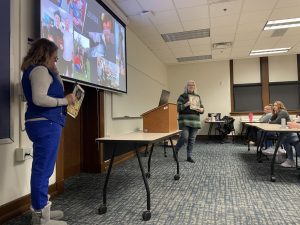Journalism program on ‘pause’ at Winona State
Phelps Hall pictured, the Mass Communication Department’s main academic building at Winona State University.
April 13, 2022
Dr. Tanya Ryan, department chair and professor in the mass communication department at Winona State University, sent out an email on March 31 informing the program’s students of the ‘pause’ of the journalism major and minor.
“Due to WSU budget issues, the Administration has decided to pause the Journalism program (both the major and the minor). For the time being, NEW students will not be able to declare Journalism as a major or as a minor,” Ryan stated.
Although the program is going on ‘pause,’ Ryan did lay out a way for current journalism students to graduate in the announcement. Students who have already declared a major or minor in journalism will be able to continue their studies.
Dean of College of Liberal Arts at Winona State, Peter Miene, also spoke to why the journalism program is taking a temporary leave.
“We are “banking” the journalism major and minor because of the *retirements in the last few years of all the permanent faculty members who taught in journalism,” Miene explained.
Miene continued, explaining the financial issues Winona State has been going through played a part in the decision.
“The university has gone through several budget reductions while these retirements were occurring, and we have not been able to replace these faculty positions,” Miene said.
Scott Olson, president of Winona State, also pointed to financial difficulties and lack of enrollment being behind the program’s pause.
“If we had unlimited resources, we would like to keep the journalism department, but we do not have the resources or the demand for the program,” Olson said.
Earlier in the 2021-22 school year, mass communication student Ethan Kolb described the difficulties of the department having lost several faculty members without being replaced in a written statement.
“Starting in the Fall of 2022, we lose our termed professor and two have applied for sabbatical. This creates a challenging opportunity. However, this opportunity comes with a great loss. This loss represents the quality of education that this university prides itself on. This leaves two full-time professors and a department chair to teach an entire department,” Kolb stated in the letter, detailing the need for further university support for the department.
With the program’s recent announcement of a new minor and Master’s program being added to the department alongside the news of the journalism program being paused, Kolb’s sentiments have proven correct.
Miene said the pausing of this mass communication program does not mean further cuts will be made for the rest of the department.
Olson explained how when long-time mass communication professors Tom Grier and Dan Eastman retired at the end of the 2020-21 school year, they were replaced with public relations, creative digital media, or advertising professors instead.
These professors include Kay Hannahan and Patrick Lichty, the two professors that have been added to the department since the retirement of Grier and Eastman. Both of these professors primarily teach in the Creative Digital Media discipline.
Brady Aufderheide, a third-year advertising major, said he ‘disapproves’ of the journalism program pause.
“I don’t like that it is leaving considering how small the Mass Communication Department is already,” Aufderheide said.
Audrey Wulfing, a fourth-year journalism major with a minor in psychology, said they are saddened by the news.
“I just feel sad to see the program go. WSU was the only college I really looked at, and journalism was the only program I saw myself in. I have learned such valuable information and made long-lasting connections in the journalism program. I wish more people could experience what I did,” Wulfing said.
Wulfing continued, saying they think journalism is important and should not be ‘paused.’
“The professors in the program are one of the biggest reasons why it was so special, because you can tell they care so much about students and the future of journalism. I think if it was up to them, the program wouldn’t be ending. It is unfortunate to see the school’s budget issues affecting programs like this. Journalism is such an important field and something we all rely on so much, so seeing it be cut is disheartening,” Wulfing said.
*The Winonan has covered the budget deficit issues and BESI program implementation that led to many early faculty/staff retirements.
The opinions expressed in this paper are not necessarily those of Winona State University, the Minnesota State Colleges and University system, or the Winona State University student body.





































Greg • Apr 13, 2022 at 6:23 pm
Sad to hear, there is a lot of opportunity after college for journalist that seek it.